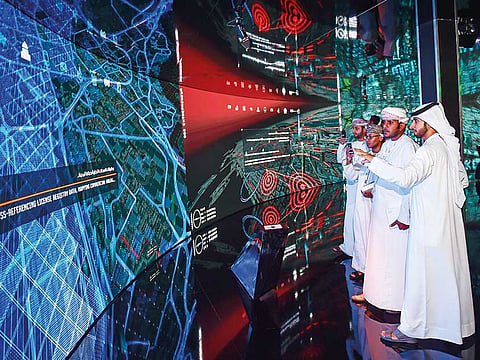Engaging experiences drive demand for AI in UAE
It is set to become enterprise’s digital spokesperson

Dubai: Artificial Intelligence (AI) is taking on larger roles within every interface and is at the heart of most of today’s technological innovation, industry experts said.
AI is software built to learn or solve problems similar to a human brain. It is central to understanding the needs and desires of different consumers and personalising services.
It is set to become the enterprise’s digital spokesperson by acting as the face of digital brand, and emerging as the key differentiator in interactions with customers.
Omar Boulos, regional managing director, Accenture Middle East and North Africa, said that the Middle East region proves to be to be one of the early beneficiaries of AI due to its digitally savvy population.
Megha Kumar, research director at International Data Corporation, said that use of AI is predominantly driven by the need to automate tasks, improve processes, labour augmentation and more importantly extracting value from all the information that is currently being generated in our ecosystem.
According to Accenture’s recent survey, 73 per cent of consumers currently use or are interested in using the voice-enabled digital assistant in their smartphone, PC or other devices.
Boulos said that the UAE consumers are ahead of global averages in readiness to adopt AI-powered devices and services. “Such usage is a positive signal for this category as it represents a much more enthusiastic adoption pattern than many new product categories recently released. Furthermore, 76 per cent are comfortable with an AI application compared to a global average of 44 per cent. Customers here are absolutely willing to take that leap and leveraging the technology,” he said.
“The advantage of AI for consumers is that how you can get the best possible answer. That is where the AI comes in to give you what you need and when you need but how is the media. The media can be Amazon Alexa, Goggle Assistant or Apple Siri. Digital has impacted each and every aspect of our life, whether you are a consumer or a government entity. Digital has truly changed how we work and how we operate,” he said.
Moreover, he said that engaging experiences are spurring demand for smart devices and the employment of new technologies, with the UAE bucking global average trends. Consumers in the UAE have strong interest in new device access models and are knowledgeable of what is coming next.
According to Fjord Trends 2017 report, while AI has evolved exponentially, 2017 will see a shift in organisations approaches to developing products and services as emotional intelligence (EQ) becomes a critical AI differentiator.
“Many of the AI use cases that we see happening in the UAE are around automation of customer services, sales process recommendation, fraud analysis and threat intelligence,” Kumar said.
As AI technologies improve and use cases mature, she said that AI functionalities will become more pervasive across organisations and industries at large.
Andy Rowsell Jones, vice president and distinguished analyst at Gartner, said that CIOs are also increasingly adopting AI in their organisations. Predominantly, AI is being used initially, either to boost the customer experience or to fight fraud.
He said that CIOs surveyed rank AI, followed by digital security and the internet of Things (IoT), as the most problematic technologies to implement. Survey respondents agree that the most common pain point is the fact that these technologies, particularly AI, demand new skills, some of which can be hard to find.
According to market intelligence firm Tractica, revenues generated from the direct and indirect application of AI software will grow from $1.4 billion in 2016 to $59.8 billion by 2025.
Facts and figures
UAE consumers rank high in appetite for AI
76% are comfortable with an AI application responding to their query — compared to 44% globally
68% interacted with computer-based applications in the last 12 months — compared to 31% globally
82% cited the availability of AI anytime as a key reason they prefer it to human interaction
74% said AI engagements were faster and politer than human interactions
Sign up for the Daily Briefing
Get the latest news and updates straight to your inbox



